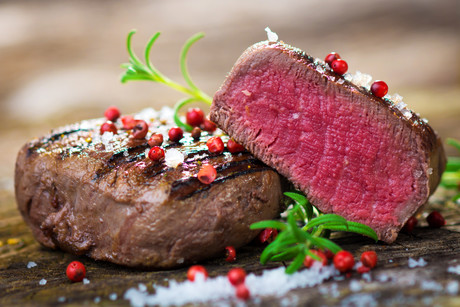Clean meat start-up 3D prints steak

Israeli food tech start-up Aleph Farms has developed a technology to 3D print clean meat that mimics the same structure and taste as traditional cuts of meat.
Clean meat is created by replicating animal cells from a real cow in a lab environment and overcomes the environmental and health impacts associated with meat. With no antibiotics, no animal slaughter and a smaller environmental footprint, these benefits are encouraging consumers to shift away from conventional meats.
But one crucial issue in the development of clean meat is ensuring it as similar to real meat as possible. Previously, clean meat has only been created using one or two types of cell tissue, which means it was largely limited to processed forms such as ground meat.
Co-founded in 2017 by Israeli food tech incubator The Kitchen and the Technion, Aleph Farms uses a three-dimensional platform to grow the four core meat cell types together in order to create complex tissue. This means it can create more structured meat similar to free-range meat, such as steak.
“It has been a major hurdle to mimic meat’s many properties, such as texture, shape, juiciness and flavor,” said Professor Shulamit Levenberg, co-founder and chief scientific officer of Aleph Farms. “Our use of the four cell types found in conventional cuts of meat, including vascular and connective tissues, is the key to a product that will be closer to the beef that people crave.”
Aleph’s clean meat appeals to consumers who are increasingly concerned with environmental issues but do not want to compromise on quality produce.
“Consumers — especially millennials and flexitarians — care about animal welfare and the environment,” explained Didier Toubia, co-founder and CEO of Aleph Farms. “At the same time, they want to eat juicy, indulgent steak — not just ‘protein’. Our goal is to help these consumers adhere to their personal standards, while getting to enjoy safe, sustainable meat.”
Bruce Friedrich, executive director of The Good Food Institute (GFI), a non-profit promoting the clean meat industry, praised Aleph Farms’ technological developments and suggested there was plenty of room for growth in this industry.
“Aleph Farms’ advantages are its strong R&D capabilities, academic collaborations and experienced team,” said Friedrich. “These give the company a significant leg-up!”
The technology is still at the R&D stage, but the company hopes to gain consumer acceptance and market its product internationally.
Unlocking the benefits of avocados across the value chain
Westfalia Fruit is helping to advance the future of the avocado sector with its zero-waste,...
Risk management approach for toxin in infant formula
Following recent recalls of specific infant formula products, the European Food Safety Authority...
Fast detection of food contamination using enhanced AI tool
A deep learning-based model has been developed to detect contaminants within three hours in foods...











